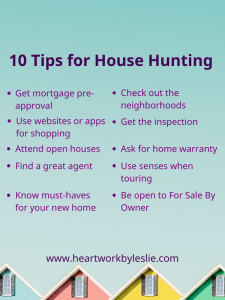This post may contain affiliate links, which means we may receive a commission, at no extra cost to you, if you make a purchase through a link. Please see our full disclosure on the Affiliate Disclosure Page.

Are you in the process of shopping for a house? I have 10 tips for house hunting for you.
Recently, meaning like in February 2022, my family and I bought a house. It’s not a new house, but it is new to us. This is not our first home together. My husband and I have bought three other houses together.
Over the years, we have spent a good bit of time house hunting. It is never a short process, but this time was probably the easiest for us.
Now that we have been in the house since the beginning of March, I have had time to think about the process we went through. In doing that, I came up with 10 tips for house hunting and 2 bonus tips.
10 Tips for House Hunting
Get Mortgage Pre-Approval
Before you head out to tour houses, talk to a mortgage lender. Get a pre-approval so that you can learn what the lender will be willing to give you. It will help you determine what you can afford, as well. There is a chance that you will qualify for more money than you will be able to make the payment.
 For example, if you qualify for $500,000 with a payment of $1550/month, that’s great. However, you may currently be stretched to pay the $1100/month on your current house. You can speak to the lender and tell him/her what payment you want. The lender can then adjust the amount available to you, so that you do not exceed the desired payment.
For example, if you qualify for $500,000 with a payment of $1550/month, that’s great. However, you may currently be stretched to pay the $1100/month on your current house. You can speak to the lender and tell him/her what payment you want. The lender can then adjust the amount available to you, so that you do not exceed the desired payment.
A pre-approval can help you figure out how much of a down payment you will need also. Depending on the type of loan and the amount of the loan, your down payment will vary.
Finally, a little suggestion for this tip is to keep some wiggle room in your budget. Don’t shop at the absolute top of your budget unless you have money set aside for things like curtains, paint, lamps, and other things you will need for the new home.
Know Your Must-Haves in the New Home
When you begin house hunting, you need to know what you want. Here are some things to consider:
- Number of bedrooms
- Number of bathrooms
- Homeowners Association or not
- Garage/Carport/Driveway
- Ranch or Multi-story
- New build or established
- Neighborhood or stand-alone
- Specific school district
- Home systems (heating/air, security)
- Price range
- How much land
- What area you want to live
This is only a list of things to get you started thinking. Also consider: do you need an office? A basement? A shed? An attic? What are the things you need in a new home? Make a physical list, and take it with you when you tour houses.
When you are making a list of what you need, also make a list of your deal breakers.
When we were house hunting, one deal breaker for me was steps. I have problems with my knees, so I knew that when we bought a new house, I wanted a ranch. I did not want to have to go up and down steps daily. In our previous house, where we lived for 9 years, our living room, kitchen, and dining room were downstairs. All 4 bedrooms were upstairs. That meant that I had to go up and down the steps daily. I tried to avoid it as much as possible and do everything on one floor while I was there. Now, everything is on ONE floor, and I love it. I can get to every room without having to use stairs.
Know your deal breakers. Have non-negotiables. Make a list of those, and let your agent know these as well. That leads into the next tip.
Have an Agent
Real estate agents are great to help you navigate the process of house hunting. They have been trained in the lingo and know how to find houses for clients. They know how house hunting and house buying works, so they can help you through it.
If you are like me, you have friends and family who are real estate agents. That’s amazing. Before deciding which one you are going to ask to help you find a home, talk to them. Ask them questions about their processes in the hunt. Find the one that you will be able to work with and communicate with the best. 
You will have a lot of questions and need to be able to communicate with your agent. Find out how each agent you know communicates. If you prefer phone calls, don’t work with someone who only sends texts, or vice versa. Find someone who is on the same wavelength as you are.
Once you choose an agent, he/she will be a personal shopper of sorts for you. You will tell him/her what you are wanting in a house. Your agent will begin searching online and send you links to houses that match what you want to see. In some cases, an agent will tour the house before you and let you know if he/she thinks you will want to see it yourself. If he/she gets there and finds out that the house has one of your deal breakers, he/she will be able to save you the trip to the house.
Use Websites and/or Apps
Although your agent will send you houses, you can search on your own as well. Here are a few websites and/or apps that you can use while you are house hunting.
 Zillow.com
Zillow.com
Realtor.com
Trulia.com
Realtytrac.com
Many times these will have some of the same houses listed on them, but sometimes you will be able to find different ones on each site. You can save favorites on them and share links to your agent.
Attend Open Houses
Sometimes on the websites and in the information from your agent, you will find houses that are having open houses. This is a time when the listing agent will be at the house and can answer questions for you. It’s possible that other homebuyers will be there as well.
Ask questions, but also listen to the questions that other people have. You could get great information from those answers, as well. 
You can attend open houses with or without your agent. However, if your agent is not with you, let him/her know that you will be attending. A lot of times, agents know one another. The listing agent may let your agent know that he/she saw “one of his/her clients” at the open house. If you told your agent, he/she can say, “I’ll bet it was __________. They told me they were thinking about stopping by there.”
Open houses are good ways to get to see houses without having to set up a separate appointment. Most of the time, at least in my area, they are held on weekends. That makes it more convenient, usually.
Check Out the Neighborhoods
Unless you are looking at houses in an area where you already live or spend a lot of time, you need to check out the neighborhood.
For us, it meant that we rode by the house at different times of day. We checked out what kind of things were going on outside in the neighborhood, traffic, lighting at night, and anything else we could see.
I am terrified of dogs. (That’s a story for a different day!) So when we were checking out houses, I looked to see if the neighbors allowed their dogs to run loose. I looked to see if fences could hold the dogs that were in them. It’s a real fear, and I had to make sure I could get into and out of my house as I needed/wanted.
When we were riding around the neighborhoods, we would talk to neighbors who were outside. We would ask questions about the schools and the area. It gave us an idea of how many adults and kids were around the house.
You can ask friends/family about the neighborhood, if you know people who live there already. Ask pointed questions. Be sure to get all the answers you want.
If you want to, you can check public police reports to see what kinds of things are called in for the area. Is it petty stuff or major stuff?
Learn as much about the area as you can before you buy a house. You do not want to get a lot of surprises when you move into a new house.
Be Open to For Sale By Owner
Although you are working with an agent, you can still look at houses that are listed as For Sale By Owner. The owners are not working with an agent to sell their house, but your agent can help you purchase it.
You may be able to get a better deal on the house because the owners will meet you and get to know you. The fact that they do not have to pay agent commissions will also factor into the deal you can get.
Get an Inspection
If you are purchasing a newly built house, you can get the inspection report from the builders. You will not necessarily need to have an inspection completed on your own, but you can.
Inspections may cost a couple hundred dollars, but they can save you a lot of money as well. You can find out if there are any issues with the home that the sellers did not disclose. (It’s possible they do not know of all the problems.)
Your agent can help you to find the right inspector. He/she can also help you to negotiate getting things fixed by the seller. It’s possible that the seller will drop the price so that you can have the things fixed on your own. Or the seller may agree to have things fixed.
Be sure to check the inspection report with your agent and see what he/she suggests you do to move forward with the negotiation and deal.
Ask for a Home Warranty
A home warranty can help you protect your home and your wallet. If you choose the right one, it will cover some or all of the costs associated with repairs or replacement of home systems or appliances.
In one of our previous houses, the home warranty covered the cost to replace our hot water heater. It also covered the cost of clean-up because the old hot water heater had leaked in our garage; there was a lot of water in there.
Your agent can help you decide what kind of home warranty to request. He/she can also help determine if you should negotiate it into the purchase of the house or if you should plan to purchase it yourself. They can cost a couple hundred dollars, but they are well worth it, and you need one.
Use All Your Senses When Touring Houses
The last of my 10 tips (before the two bonus ones) is to use all your senses when house hunting. It will help you get a feeling or “vibe” for the house.
I know it will probably be hard to taste a house, and I don’t suggest that you try. I do, however, suggest that you use your other senses.
Smell the house. If it is musty or moldy, that could be a sign of a problem.
Look at the house. Are there cracks in the walls or floors?
Listen to the house. Do the floors creak? Can you hear the wind through the doors and windows?
Touch the house. What do the surfaces feel like? Are there sharp edges? Is there a puddle under the sink?
Use all your senses to test the house and see if it feels like home to you.
Bonus Tips
Don’t Dwell on Cosmetic Issues
Remember that flooring, paint, and lighting are all cosmetic. You can replace or change any of those things when you own the house.
 Our current house has a green bathroom. Yes, green. The toilet, flooring, walls, sink, shower, everything is green. It’s very 1980s. It’s not my preferred color, but is it functional? Yes! Can we live with it until we change it to what we want? Yes!
Our current house has a green bathroom. Yes, green. The toilet, flooring, walls, sink, shower, everything is green. It’s very 1980s. It’s not my preferred color, but is it functional? Yes! Can we live with it until we change it to what we want? Yes!
Cosmetic things are changeable. Don’t stress over them, unless they are on your deal breaker list.
Think Long Term
Think about the room you are going to need in 1 year, 5 years, or 10 years. Will the home work if you add a partner? If your parents are older and move in, will the house be big enough? If you have children, will you have room? What happens if you get a pet?
Think about what you need the rooms for. If you need an office for a business or hobby, does the house have that? If you have 1 ½ bathrooms in the house, can you turn the half-bath into a full one over time?
Don’t limit your search to what you have and/or need right now. Think about the future.
Wrap-Up
If you are house hunting, I know that it can be daunting. Use these 10 tips for house hunting and find the right house for you.
If you have other tips that you suggest, leave them in the comments. This will help others to see your experience and advice as well.
